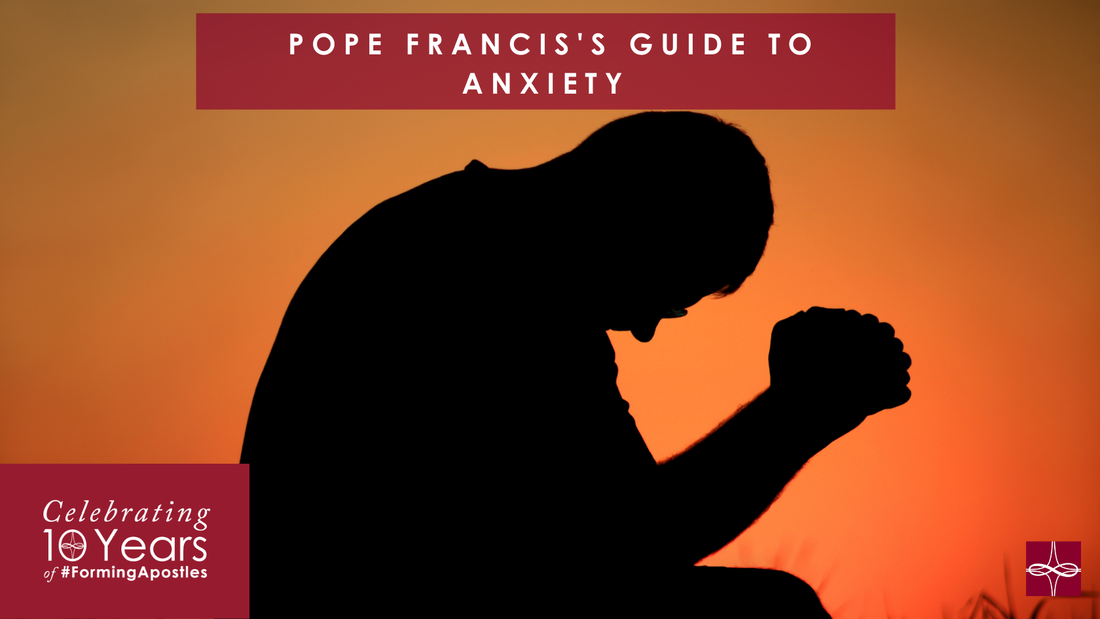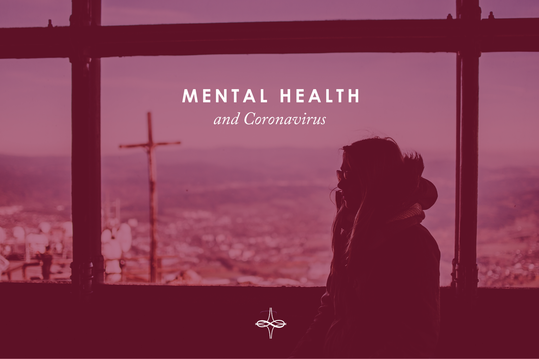|
One of the greatest gifts of Pope Francis’s pontificate is our pope’s willingness to write and speak about the day-to-day realities of many people everywhere. However, there is one experience which Pope Francis writes about that resonates with me most strikingly as a young adult and young professional: anxiety. And, according to the National Alliance on Mental Illness (NAMI), I am probably not the only person with whom Pope Francis’s words resonate. In 2020, an estimated 48 million people experienced an anxiety disorder. Anxiety and anxiety disorders exist on a spectrum, ranging from mild interference with professional, relational, and/or other aspects of a person’s life, to causing major difficulties performing basic functions of human life. In other words, anxiety can look like worrying about an upcoming meeting to the extent that it causes racing thoughts and accelerated heartbeat or it can look like a debilitating fear that causes avoidance of daily plans and activities altogether. So, what does Pope Francis have to say about this wide-ranging experience that shows up in the lives of so many? In his 2018 Apostolic Exhortation, Gaudete et Exsultate, Pope Francis sees anxiety as something that can cause us to act for the wrong reasons: “Needless to say, anything done out of anxiety, pride or the need to impress others will not lead to holiness. We are challenged to show our commitment in such a way that everything we do has evangelical meaning and identifies us all the more with Jesus Christ.” Here, Pope Francis identifies that the worries, racing thoughts, and fears can thwart our best judgment and right intentions. Experiencing anxiety can cause us to miss the mark in our perceptions of others, ourselves, or certain situations. Rather than coming from a place of a collected and balanced mindset, we may be influenced by anxiety to choose to act out of fear or worry. In his 2013 Apostolic Exhortation, Evangelii Gaudium, Pope Francis shares a similar sentiment. When describing the patience and time it takes to promote the common good of a society in paragraph 223, our pope encourages, “What we need, then, is to give priority to actions which generate new processes in society and engage other persons and groups who can develop them to the point where they bear fruit in significant historical events. Without anxiety, but with clear convictions and tenacity.” Here, Pope Francis follows a similar thought to Gaudete et Exsultate: anxiety clouds our judgment and perceptions—preventing us from taking clear steps forward in difficult situations or relationship challenges. Perhaps Pope Francis’s punchiest paragraph on anxiety comes from Christus Vivit. In paragraph 142, he cautions young people and the entire church in falling prey to the fear and paralysis that comes from anxiety: “Keep following your hopes and dreams. But be careful about one temptation that can hold us back. It is anxiety. Anxiety can work against us by making us give up whenever we do not see instant results. Our best dreams are only attained through hope, patience and commitment, and not in haste. At the same time, we should not be hesitant, afraid to take chances or make mistakes. Avoid the paralysis of the living dead, who have no life because they are afraid to take risks, to make mistakes or to persevere in their commitments. Even if you make mistakes, you can always get up and start over, for no one has the right to rob you of hope.” Here, Pope Francis highlights how anxiety can prevent us from moving forward. How often are we afraid to pick up the phone and call a friend that we haven’t spoken to in a while because we are anxious about what to say? Or how many times have we put off a difficult conversation because we are fearful about how it might change our relationship with the other person with whom we speak? How many times have we passed up applying for that school, a certain job, or taking on a particular project because we are afraid that our abilities wouldn’t measure up? For Pope Francis, many of these situations have anxiety at their root. So, what can we make of how Pope Francis writes about anxiety? For our pope, anxiety is a difficult and challenging issue. Though Pope Francis mentions anxiety can affect a person’s life negatively, notice that he never mentions anxiety as sinful. Like other health and mental health conditions and experiences, anxiety itself is not a sin and is not a punishment for sin, but rather comes from our imperfect human nature. What Pope Francis does hint at, though, is that learning to live with anxiety contributes to our holiness. How does learning to live with anxiety contribute to our growth in holiness? Learning to manage our anxiety—whether through a relationship with a licensed therapist, medication, self-care practices, or other means of support—allows us to live out our calling to holiness more freely and generously. Anxiety causes us to make decisions, act, and cope with the situations of life out of worry, nervousness, and fear. Managing our anxiety allows us to learn to live more mindfully and intentionally, gain insight into what is causing our fear and worry, and make choices to act from a place of balance and discernment. In other words, instead of being paralyzed by anxiety, learning to manage it allows us to respond to others and situations in our lives more thoughtfully—seeing them not as threats or reasons to make judgments out of fear, but opportunities for us to be drawn out of ourselves, despite our nervousness or fear. If holiness means to set apart our lives for God’s action and living out our mission, our experience of anxiety can be a part of our vocation to holiness as we see it as an opportunity to grow, become more generous, place our trust in God, and challenge our fears. As Pope Francis encourages us in paragraph 143 of Christus Vivit, “Take risks, even if it means making mistakes. Don’t go through life anesthetized or approach the world like tourists. Make a ruckus! Cast out the fears that paralyze you, so that you don’t become young mummies.”
1 Comment
As a human race, we have entered uncharted waters and new territory as we struggle to continue our lives in the midst of the coronavirus pandemic. Many of us have attended to socially distancing ourselves, picking up essential items from the grocery store, and ensuring that our loved ones are safe and supported. As Catholics, we’ve found creative ways to gather to celebrate Mass and pray with others all over the nation and the world. However, in the midst of giving attention to all of these demands, we might forget to take care of one crucial thing in particular: our mental health. As someone who lives with anxiety, depression, and other mental health issues, I can confirm that the presence of coronavirus and the changes it has wrought in my daily life are making it particularly challenging to cope. I find myself with racing thoughts: When will this be over? Will my loved ones and I be protected? How much will this affect my finances? Where even is God in this? This is why I am particularly invested in my mental health right now: the challenges of the pandemic have the potential to trap me in an endless state of anxiety, panic, and depression. Although the pandemic presents me with challenging days ahead, I know that I can survive them by taking extra care of my mental health. To take a step back, why should mental health matter to us so much as Christians, especially now? First, mental health allows us to live in right relationship with ourselves, others, and God. By cultivating mental health, we can strengthen self-esteem, learn how to be a more compassionate friend or partner, or learn how our human experiences have affected our relationship with God. Second, focusing on our mental health allows us to be stewards of God’s creation, specifically good stewards of the body that God has created and given to us. Though we are living in a time of panic and uncertainty, we have agency and the ability to take care of ourselves in a way that allows us to continue the hard work of bringing forth the Kingdom of God, even in a pandemic. Third, focusing our efforts on our mental health is bound up in our pursuit of holiness. As we focus on mental health, we grow in self-awareness, communication, compassion, and moral judgement; in other words, we engage in formation that allows us to be a “bridge and not an obstacle” (Pastores Dabo Vobis, 43) to Jesus Christ in our own lives and the lives of others. In other words, intentionally focusing on our mental health during this challenging time is a way in which we can follow the command to “love the LORD, your God, with your whole heart, and with your whole being, and with your whole strength” (Deuteronomy 6:5). In being intentional about my own mental health at this time, here are some thoughts and practices that I’ve found most helpful in coping with uncertainty, panic, anxiety, and depression:
How can you engage in practices that cultivate your self-awareness this week? What/who are valuable resources of support? How do you feel that you need to show up for yourself this week? Where could you use some extra self-compassion in your life? Finally, how might being intentional about cultivating your mental health bring you into right relationship with yourself, others, and God during this time?
3/20/2020 In This Together: A Resource Guide for Families During Coronavirus Quarantine | COVID-19 ResourceRead NowTo all the parents home with their children, who are looking for creative, easy, or fun ways to spend the day, here are some great options to try for spiritual, mental, and physical health! Set a routine. It is important to establish consistency and keep kids on a structure like they are during a school day. For older children, have them collaborate with you as you create a schedule to allow for some influence on their day. It allows for predictability in the day, and children knowing what is expected of them is crucial to the well-being and peace of all in the family. Below is a schedule example. This can be used as a starting place for your family. Feel free to move things around or dedicate your time differently. What’s important is maintaining a routine that works for your family! Example:
Focus on gratitude. With many feeling anxious and having to deal with a lot that is so unknown, having a grateful heart can mean a world of difference for your well-being and that of your family. Have your child write thank-you-notes to mail carriers, restaurant workers, grocery store employees, and members of the family. Or, start the day by finding 3 things to be grateful for, then end the day like that too. Talk about this with your child and share your gratitude with them.
Prayer. There is nothing more powerful than prayer, and prayer as a family is crucial during this time at home together. Make time. Take time. Add it to a daily routine. In addition to saying prayers you may know by rote, consider reading the Daily Readings from USCCB to read the Word together in prayer. Play! For young children, older teens, and everyone in between, play is crucial. For older children that may mean down-time or free time to decompress, but for young children in elementary school this is so important for development. Playing together, but also playing independently helps support their creativity. As a parent, also take some time to think of ways you can “play”—not only with your children, but with your spouse or on your own. Make sure to come up with fun activities that are life-giving for you and your spouse: board games, a puzzle, baking, etc. Pretend and make believe. “Boredom breeds creativity” I was once told, and I couldn’t agree more! When children are given a chance to imagine and pretend away from distractions and technology they will think up all kinds of incredible things. As a parent, you may need to guide or inspire some pretend or make-believe with prompts or guidelines until your kids seem ready to take-off on their own. Even giving your child a difficult or challenging task and saying, “figure it out” may help for older kids who need to problem-solve. But here are some ways to get started:
Exercise. For children of all ages and adults too, exercise is so important. Although we must consider social distancing, getting outside and even just taking a walk is more crucial than ever as we are in our homes all day long. If you don’t have a yard to play in, try walking to the closest field or park to catch a ball or ride a bike around the neighborhood. If you cannot get outside, there is plenty to do inside. YouTube has workouts for children and adults, and there are workouts on Netflix and other streaming services to get you started. Write letters. This is a nice thing to do at all ages and levels of writing abilities, young ones can draw pictures and write what they can, while older kids could tell someone all about their latest adventure at home. Write to grandparents, relatives, elderly folks in nursing homes, neighbors, and friends from school who are also at home. It’s amazing how good someone may feel receiving a note or letter, knowing your child was thinking of them. Call someone, FaceTime, or video chat with someone. We are blessed in this digital age to have technology that can still keep us “together.” Calling friends, family, and loved ones, either on the phone or using a video chat application, maintains and strengthens our relationships with people we may not be able to see or visit right now. Read a book. Have your child help you create a booklist of 50 or 100 books and see how many they can read, then have a fun prize like baking cookies together or extra down-time be the reward. Activity pages made by teachers. For kids who are out of school altogether, look for materials online to keep kids up to speed on math skills, reading activities, and everything in between. With schools shut down, there is plenty out there to find! Make your own studying tools. Don’t forget that anyone (including the student) can make flash cards for addition, subtraction, multiplication, and division - as long as you have paper and something to write with! Some drills you could practice:
Fine motor development. Play with Play Doh (or make your own). Squeeze items with tweezers. Count and play with beads or buttons. Bake and roll out dough, ball up cookies, or knead pizza dough. We are living in unprecedented times which can add to the stress level of family life. We invite you during this pandemic to see this as a blessed time to rekindle relationships within your families and communities through prayer, play, and creativity and hope these resources will prove fruitful for you as we continue to navigate this time. Click here to visit our COVID-19 Resource Page Click Here to Download this Post as a PDF! What does it mean to be a human person? Psalm 139:14-15 proclaims, “I give you thanks that I am fearfully, wonderfully made; wonderful are your works. My soul also you knew full well; nor was my frame unknown to you when I was made in secret, when I was fashioned in the depths of the earth.” Despite physiological or personal obstacles, each member of God’s children deserves to feel comfortable in their own skin. At its core, health and wellness maintains a sense of individuality that spans many shapes, sizes, and functionalities. In every stepping stone of my career as a health and wellness professional, I have lived by this ideal. As an active Catholic, I also believe in the spiritual aspect of health and wellness. However, it is only recently that I have begun to realize the weight of what this means to me as a Catholic professional in today’s society. When the proclamation of this psalm began to speak to my heart and, more importantly, when I began to listen, my interpretation of the philosophy that has been written on my heart for so many years burst forth into a new light.
There are a multitude of outside influences that are attempting to tear down the human person as designed by God. Secular society tends to create boxes to place every person inside. The secular world in which we live wants us to think that they celebrate individuality, while simultaneously expecting us to meet the standards that they are creating. We are placed in a certain box based on our physique, appearance, material goods, professional success, and the list goes on. In turn, we become self-focused. Life either becomes a game of getting ahead and finding the easiest way to receive instant gratification or a retreat into the darkness of, “I’m not good enough”. Our bodies are truly a temple for the Holy Spirit. Sadly, society not only ignores the responsibility that comes with such a gift, but impresses upon us that “being fit” or rejoicing in the comfort of our God-given skin must conform to the box in which society presents. So, what is the good news? The human person, as designed by God, was not designed to be placed in a box. Pope Benedict proclaimed, “The ways of the Lord are not easy, but we were not created for an easy life, but for great things, for goodness.” I assure you, the greatness Pope Benedict XVI speaks of does not fit in a box. God saw and loved in His Son what He loves in us: humanity. We are a Resurrection people made in the image and likeness of our God, the resurrected Body of Christ. You, a human person, are made in His image and likeness. We truly are the body of Christ. Therefore, it is essential to look after all aspects of our wellness from this perspective. Rejoice and praise Him with song, dance, movement, human interaction, and day to day life. If we can strive to live this realization together, we can experience something extraordinary, life-altering, and full of excitement, motivation, and healing. These are the thoughts and ideals that I strive to live by and share with those that I meet. “Do not conform yourself to this age but be transformed by the renewal of your mind, so that you may judge what is God’s will, what is good, what is pleasing, and perfect.” (Romans 12:2) Elaine Seckar is the Wellness Coordinator at Saint Patrick Church and a Fitness Clinician for United Cerebral Palsy of Central PA in Carlisle, Pennsylvania. Basketball and world peace… what do the two have in common?
As an athlete, I could tell you a lot about the positive benefits of athletics. There are many physical, emotional, mental, and social benefits and developments that come with participation in sports. As a softball coach for 8 years, I can also tell you about the many success stories that my players have had because of youth athletics. Through my years coaching, there is one story in particular that sticks out in my head, it was about 5 years ago, my Junior year of high school. One young girl, about the age of 9, joined my Little League softball team. She was one of the most difficult kids I had ever coached; between the arguing over every piece of instruction she was given, the fighting with the other girls, and the bad sportsmanship, which resulted in many games spent on the bench, we struggled. I was so frustrated with her, until things changed about 10 weeks into the season, when her grandmother came to me to say thank you. She told me that this girl’s father had left her and her mother wanted little to do with her. Her grandmother signed her up for softball to get her out of the house, and into something to bring her out of herself. She told me that the time, attention, and patience I gave this girl helped her cope with the immense difficulties she was facing at home. I went home and cried that night. To be honest, I would have never experienced any of this if my father hadn’t pushed me to influence other girls the way I had been influenced as a 7 year old girl by my coaches. He taught me to turn what I love into something I could give back to the community. I never fully realized the immense positive effect youth athletics had on children until that day. Thankfully, someone else did. Two men, Brendan and Sean Tuohey started the program Peace Players international. This organization used youth athletics, specifically basketball, to bring together developing communities and bring kids out of their homes to do something to create a better world for themselves. They created PPI – Peace Players international. What I want readers to bring back from this is the power of turning what you love into something greater than yourself. Brendan and Sean Tuohey turned what they were passionate about into a program working towards a bigger goal – international social justice. While God may not call you to something as large-scale as that, maybe he’s calling you to change the life of the little girl on the neighborhood softball team. Each person has a different calling to help change the world… what’s yours? Casey Tisdell is Senior Psychology Major at the Catholic University of America in Washington, D.C. |
Details
Archives
July 2024
Categories
All
|
About |
Media |
© COPYRIGHT 2024 | ALL RIGHTS RESERVED









 RSS Feed
RSS Feed